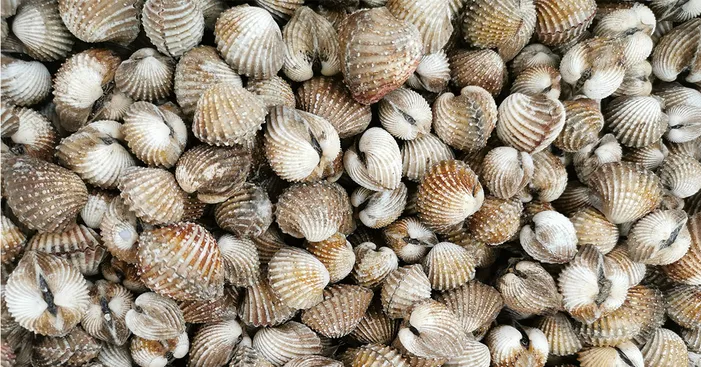
From boosting your immune system to safeguarding your heart health, cockles are nature’s unsung heroes of the sea.
Their rich iron content combats anemia, while their omega-3 fatty acids promote cardiovascular health.
Additionally, cockles are a potent source of vitamin B12, crucial for maintaining healthy nerve and blood cell function.
Embark on a culinary adventure as we delve into the captivating world of cockles, exploring their nutritional prowess and unveiling their potential to transform your health for the better.
Prepare to be amazed by the remarkable benefits these humble bivalves have to offer, and discover why incorporating cockles into your diet is a decision you won’t regret.
General facts about cockles:
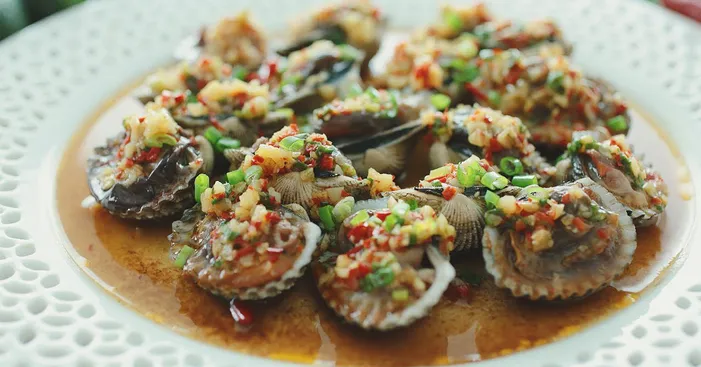
Overview:
Cockles, also known as edible hearts, are bivalve mollusks with distinctive heart-shaped shells.
Their white, domed shells are adorned with radial striations, giving them a unique appearance.
These resilient creatures thrive in saltwater environments, exhibiting remarkable adaptability to fluctuating environmental conditions.
Residing in the saline embrace of the Atlantic Ocean, the Mediterranean Sea, the Black and Caspian Seas, and along the northwest African coastline, cockles thrive in these salty havens.
A significant portion, 90% to be precise, of the cockles found on the Spanish market hail from Galicia, where their preferred habitat lies in the sandy seabed.
There, nestled amidst the sand and silt, they diligently filter their sustenance from the surrounding water, extracting life-sustaining nourishment.
The pursuit of these culinary treasures commences at low tide, employing a variety of tools such as trails, dredges, hoes, and rakes.
The harvesting season commences in autumn, and the cockles are at their prime for consumption from September to May.
Before gracing our plates, the shells undergo a meticulous cleaning process to eliminate any lingering sand.
Additionally, they undergo a self-purification process by filtering clean water.
Once cleansed, the cockles are expertly cooked, their shells removed, and subjected to a final hot water rinse to eradicate any remaining sand particles.
Why Do Cockles Sometimes Taste Bitter?
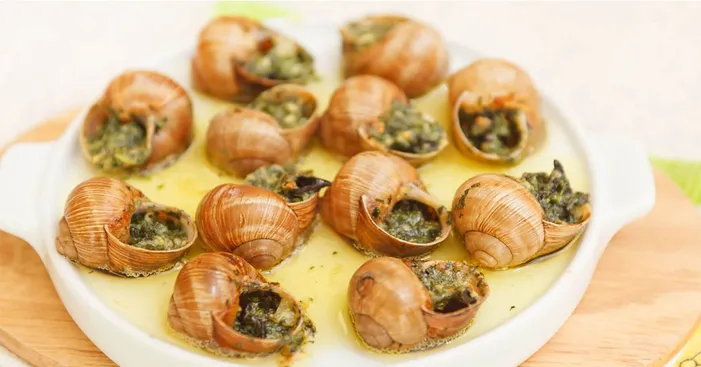
Have you ever cooked cockles and been disappointed by a lingering bitter taste?
This can be a frustrating experience, especially if you’ve put time and effort into preparing the dish.
There are a few reasons why cockles might taste bitter, and understanding these causes can help you avoid them in the future.
Among the potential causes of bitterness:
Habitat Contamination:
Cockles filter water to feed, making them susceptible to toxins present in their environment.
If cockles are harvested from polluted waters, they may retain harmful substances that contribute to a bitter taste.
Black Streaks:
Black streaks or spots on mussel meat can be caused by the presence of a parasitic worm called Mytilicola intestinalis.
While not harmful to humans, these parasites can impart a bitter flavor.
Remove any cockles with black streaks before cooking.
Overripe Cockles:
Cockles naturally become bitter as they mature.
Choose cockles that are firm and tightly closed, indicating their freshness.
Over-seasoning:
Excessive seasoning can easily overpower the delicate flavor of cockles, resulting in a bitter taste.
Start with a light hand and adjust according to your preference.
Spoiled Cockles:
Even a small number of spoiled cockles can contaminate the entire batch, imparting an unpleasant bitterness.
Discard any cockles that have cracked shells, a strong odor, or a slimy texture.
Cockles nutritional values and health benefits:
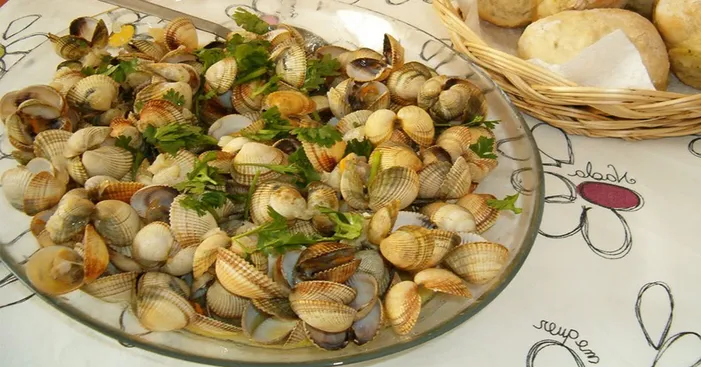
Nutritional values:
Packed into every 100 grams of cockles is a wealth of nutrients, ready to nourish your body and support your well-being.
With 16.90 grams of protein, 1.50 grams of carbohydrates, and 1 gram of fat, cockles provide a balanced macronutrient profile to fuel your day.
Additionally, each 100-gram serving contains a mere 1.50 grams of sugar, making it a suitable choice for those watching their sugar intake.
And that’s not all! Cockles also boast an impressive array of vitamins, each with its unique set of health-promoting properties.
These vitamins work in synergy to support various bodily functions, from boosting immunity to promoting cell growth and repair.
But perhaps the most impressive aspect of cockles is their incredibly low-calorie count.
For a mere 82.60 calories per 100-gram serving, you can indulge in this nutritious snack without guilt.
Whether you’re seeking a quick energy boost before a workout or a satisfying snack to curb cravings, cockles are the perfect choice.
These data counts for 3.5 ounces (100g) of cooked cockles:
- Energy: 47 kilocalories
- Protein: 10.7 grams
- Fat: 0.5 grams
- Carbohydrates: 0 grams
- Calcium: 128 milligrams
- Iron: 24 milligrams
- Iodine: 160 micrograms
- Zinc: 1.3 milligrams
- Potassium: 314 milligrams
- Phosphorus: 130 milligrams
Health benefits:
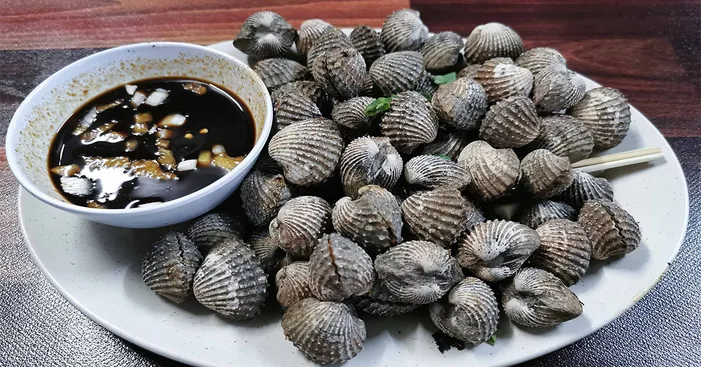
Good for the hair:
These nutrient-rich shells are packed with keratin, a protein that forms the foundation of your hair, skin, and nails.
To harness the power of keratin, your body needs iron, a mineral that also strengthens your immune system and promotes hemoglobin production.
So, embrace cockles and embark on a journey towards healthier, more radiant hair, skin, and nails.
Offers Iodine:
One of the richest sources of iodine is cockles, providing a remarkable 27 mg per serving.
This nutrient-dense seafood also offers a wealth of other essential minerals, including vitamins A and C, iron, and zinc.
Iodine, an essential mineral, plays a crucial role in human health, particularly in the production of thyroid hormones.
These hormones regulate metabolism, growth, and development.
During pregnancy, iodine is crucial for fetal brain development.
The recommended daily intake (RDI) of iodine for adults is 150 micrograms (mcg), while teenagers and pregnant women require higher amounts, 220 mcg, and 290 mcg respectively, to support their increased physiological demands.
Fuels the metabolism:
The body’s intricate machinery relies on a constant supply of energy to power its myriad functions.
This intricate dance of energy storage and utilization, known as energy metabolism, is essential for maintaining life.
Iodine, a crucial micronutrient, plays a pivotal role in this process, ensuring that the body’s energy engine operates smoothly.
Cockles, delectable shellfish prized for their culinary versatility, emerge as nutritional powerhouses, boasting a remarkable iodine content.
According to the Spanish Nutrition Foundation, a single serving of cockles can provide up to 60% of the daily recommended iodine intake.
This abundance of iodine empowers the thyroid gland to produce thyroid hormones, the maestros of metabolism, regulating the body’s energy expenditure and ensuring that cells receive the fuel they need to thrive.
Prevents osteoporosis:
Cockles are a food rich in calcium and phosphorus, two minerals essential to bone health.
Calcium is the main constituent of bones, while phosphorus helps bind them.
A 100-gram serving of cockles provides 46 mg of calcium and 22 mg of phosphorus.
These quantities represent respectively 5% and 3% of the Recommended Daily Allowance (RDA) for an adult.
Regular consumption of cockles can therefore help prevent osteoporosis, a disease characterized by reduced bone density and an increased risk of fractures.
Full of fatty acids:
Boasting a wealth of omega-3 fatty acids, cockles emerge as nutritional powerhouses, offering a multitude of benefits for cardiovascular health.
These essential fatty acids effectively regulate cholesterol levels, reduce blood pressure, and promote overall heart health.
By incorporating cockles into a balanced diet, one can reap these remarkable benefits while enjoying the delicate texture and unique taste of these exquisite seafood gems.
Great antioxidant properties:
Cockles are a good source of Selenium, an essential trace mineral that plays a vital role in human health.
It acts as a powerful antioxidant, protecting cells from damage caused by free radicals.
Selenium also supports the immune system, thyroid function, and reproduction.
Additionally, it may help reduce the risk of chronic diseases such as heart disease, cancer, and diabetes.
Other benefits:
- Lowers harmful cholesterol.
- Enhances brain function.
- Boosts immunity.
- Combats fatigue and stress.
- Sharpens mental acuity.
- Eases joint and muscle pain.
- Prevents and combats anemia.
- Fortifies bones and teeth.
- Uplifts spirits and prevents depression.
Precautions before you consume cockles:

While cockles offer a range of nutritional benefits, it is important to consume them in moderation and with caution.
One of the primary concerns associated with regular cockle consumption is the potential presence of biotoxins.
These toxins can accumulate in shellfish and cause food poisoning if ingested.
Symptoms of food poisoning from cockles can include nausea, vomiting, diarrhea, and abdominal cramps.
Another potential drawback of excessive cockle consumption is the increase in dietary cholesterol intake.
Cockles, like many seafoods, contain cholesterol.
While cockles are relatively low in saturated fat, consuming large quantities can still contribute to elevated cholesterol levels.
In summary, while cockles can be a nutritious addition to a balanced diet, it is essential to exercise caution and moderation when consuming them.
Be mindful of the potential for biotoxin contamination and limit your intake to avoid excessive cholesterol consumption.
Using cockles :
Linguine with Plump Cockles
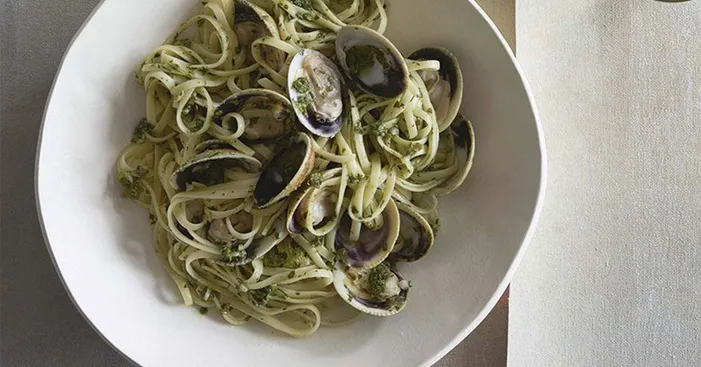
Ingredients:
- 1 kilogram (approximately) of cockles, or substitute with blue cockles if preferred.
- 300 grams of pasta, such as linguine.
- 4 cloves of garlic, thinly sliced.
- 2 shallots, finely chopped.
- 1 chili pepper, finely chopped.
- 4 tablespoons of extra virgin olive oil.
- 1 cup of chicken broth.
- 4 seeded tomatoes, diced.
- 2 tablespoons of fresh parsley, chopped.
- Salt and freshly ground black pepper to taste.
Instructions:
- Gently tap them against the sink; if they remain closed, discard them.
- Place them in a colander and rinse them under cold running water, gently shaking the colander to remove any sand or grit. Repeat this process several times until the water runs clear.
- While the pasta is cooking, prepare the cockle sauce.
- In a large saucepan, heat the olive oil over medium heat. Add the garlic, shallots, and chili pepper, and sauté for a few seconds until fragrant.
- Pour in the white wine and bring it to a simmer. Add the cockles and cover the pan with a lid. Cook for 3-5 minutes, or until the cockles have opened.
- Once the cockles have opened, stir in the diced tomatoes, chopped parsley, salt, and pepper.
- Drain the cooked pasta and add it to the saucepan with the cockle sauce. Toss gently to coat the pasta evenly.
- Serve warm and enjoy! Garnish with additional chopped parsley if desired.
Fresh Cockles in a Marinara Sauce
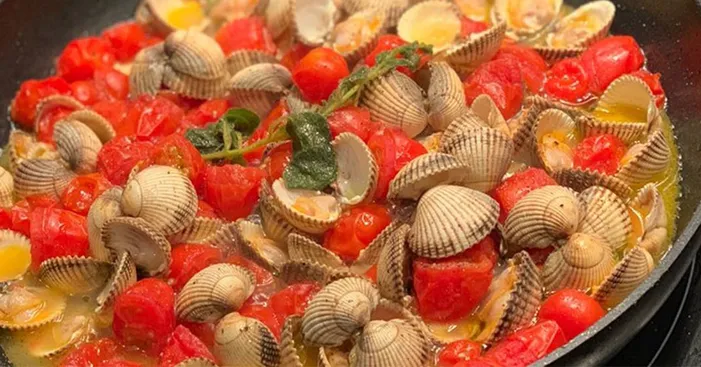
Ingredients:
- 1 kilogram (2.2 pounds) of fresh or frozen cockles.
- 6 garlic cloves, minced.
- 2 tablespoons olive oil.
- Chopped parsley to taste.
- 150 milliliters (5 ounces) chicken broth..
- 1 lemon, sliced for garnish.
Preparation:
- Place the cockles in a deep bowl filled with water. Add a tablespoon of salt, cover, and let them sit for 40 minutes. This process helps remove any sand that may be inside the cockles.
- After 40 minutes, drain the water from the bowl using a strainer. Rinse the cockles under running water to remove any remaining sand or debris. Pat them dry with kitchen paper towels.
- Heat the olive oil in a frying pan over medium-high heat. Once the oil is hot, add the cockles and cook until they start to open.
- Add the minced garlic cloves to the pan and cook for about a minute until fragrant. Pour in the white wine and let it simmer for a few minutes until the alcohol evaporates.
- Stir in the chopped parsley and turn off the heat. Let the cockles rest for two minutes before serving.
- Garnish each serving with slices of lemon and enjoy the fresh, flavorful cockles in a marinara sauce.
Choosing cockles:
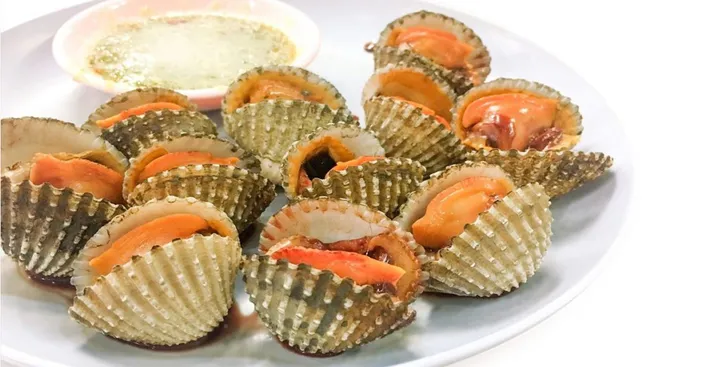
To ensure you’re cooking with the finest cockles, take a moment to inspect them carefully before purchasing.
Fresh cockles should have tightly closed shells that snap shut when gently tapped.
Discard any cockles with open shells that don’t close, as these are no longer alive and unsuitable for consumption.
Storing cockles:
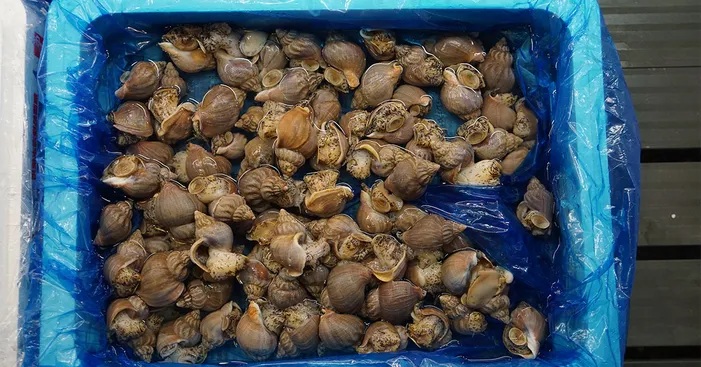
To maintain the peak freshness of your cockles, follow these simple storage guidelines:
- Refrigeration:
Keep uncooked cockles in the coldest part of your refrigerator, ideally at a temperature of 40°F (4°C).
Store them loosely in a bowl or mesh bag to allow for air circulation.
Avoid storing cockles in airtight containers, as this can suffocate them. - Moisture Retention:
To prevent the cockles from drying out, cover the bowl or mesh bag with a damp cloth or paper towel.
This will help maintain their natural moisture levels and preserve their texture. - Consumption Timeline:
Fresh cockles should be consumed within 2-3 days of purchase.
If you need to store them longer, consider freezing them.
